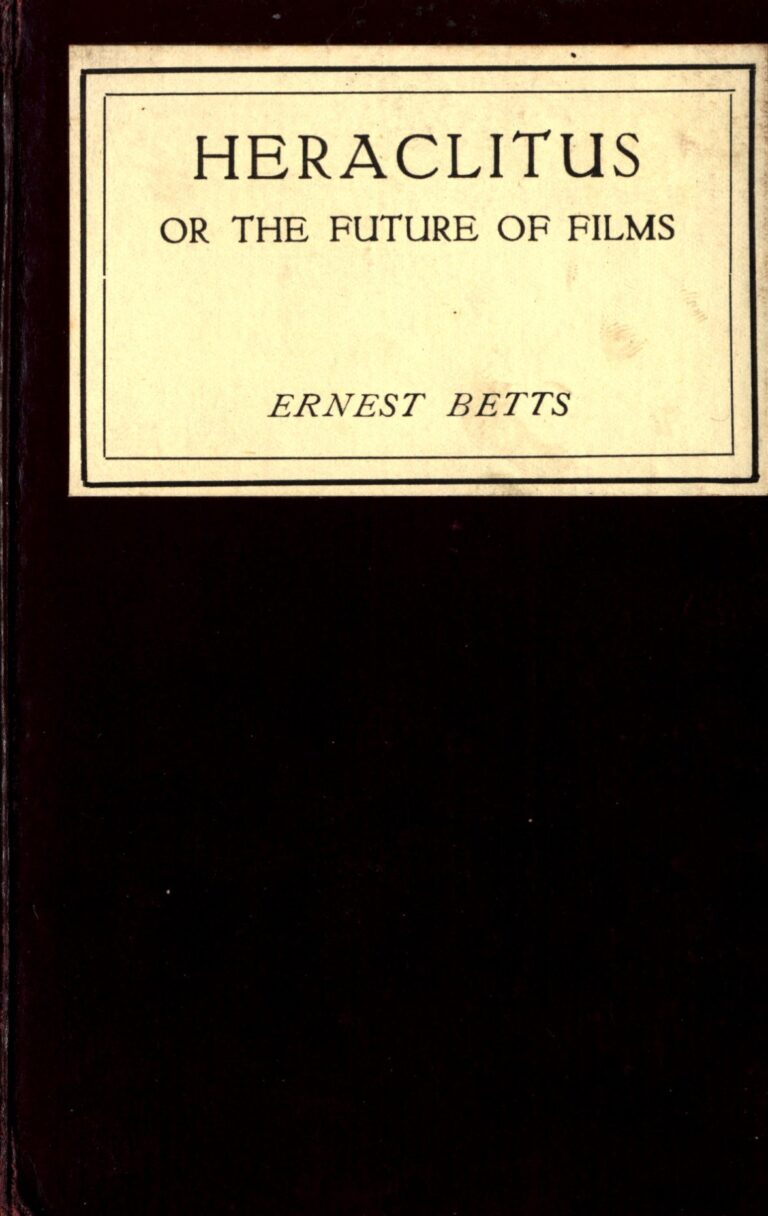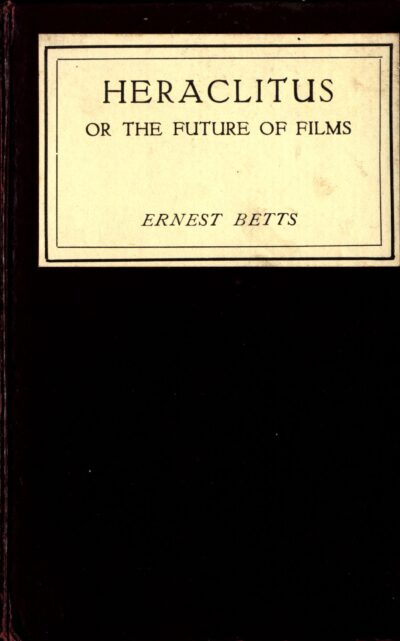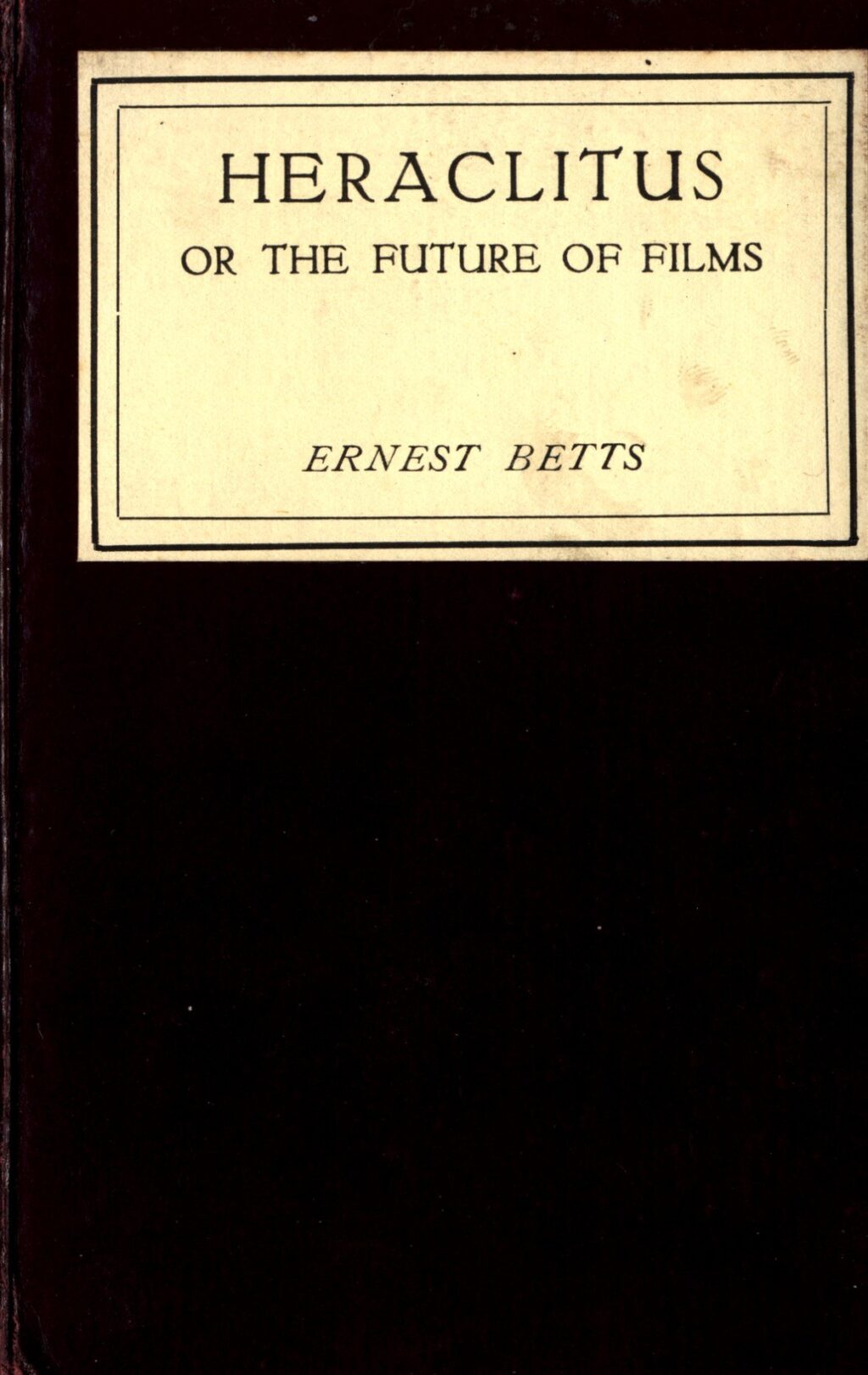Ernest Betts, Heraclitus or the Future of Film (1928)
Ernest Betts was an early British film critic whose book, Heraclitus, is a humorously dated attack on ‘modern’ developments in cinema, written at what would now be considered to be a very early period in the history of filmmaking. As an artefact in the Menzies Collection, it acts as a testament to the conservatism of some of Menzies’s artistic tastes, but also the down-to-earth sensibilities that would do so much to inform his Forgotten People philosophy.
The book is notable for its snobbish attacks on popular trends, the pursuit of profit over artistic merit, and the transition away from silent movies (which had only just begun). Betts proclaimed that with the advent of talking pictures ‘The soul of the film—its eloquent and vital silence—is destroyed. The film now returns to the circus whence it came, among the freaks and the fat ladies’. He prognosticated that ‘the film of a hundred years hence, if it is true to itself, will still be silent, but it will be saying more than ever’, though he also warned of a future in which:
‘In the year 2028, the whole population of America having reduced its day of dreaded labour to the decent minimum of an hour or two, will stream into a picture theatre and remain there, under drowsy American syrups, until bed-time. The future of the cinema, seen from this angle, and throwing the same comfortable blanket over the face of the world, is terrifying.’
As many have done since, Betts attacked the influence that American culture was already projecting through film, arguing:
‘Chiefly as a result of American films, a large part of the world, and especially the youthful world, now has a cabaret outlook, full of feeble passion, Woolworth glitter, and trumpery heroics… But there is a difference between entertaining a man by making him drink and entertaining a man by making him drunk. The American film has doped the world with rotten juices. By a strength of purpose which is staggering and its one superb virtue, it has flung at us, year by year, in unending deluge, its parcel of borrowed stories and flashy little moralities. It has gathered in millions of pounds from every corner of the earth — including the £30,000,000 or so a year which, with half-witted complacency, we ourselves have been paying — and it has done this with very little regard for the millions of human beings whose thoughts and emotions it has virtually annexed.’
In 1932 Menzies would give a speech that similarly acted as an early denunciation of the influence of American media – though he did at least distance himself from some of Betts’s strident moralism. Addressing a debating society meeting in Queen’s Hall, he argued:
‘I have a great number of grievances myself against American films, but, curiously, they are not on grounds of morality. I think that this business of blaming various new ideas for their influence on the morals of the community has been very greatly overdone. My complaint against American films is not that they are immoral, but that they are so uniformly stupid. If I were an American I should object to them very, very strongly, because I should consider them to be an insult to the country in which I lived. That is the point of view I should endeavour to bring before American picture producers. Does it not seem to be playing it fairly low down on one’s country to send into the world a succession of films representing Americans as morons – having no sense of values, no taste, no sense of humour, but possessing one of the most extraordinary social systems that the world has ever seen?
I once asked a visiting American whether there were no ordinary people in the United States. He surprised me by saying that there were. I said, “Unfortunately we never see them”. Judging by the films the standard of taste in the United States runs to a crude and maudlin sentimentality. The use of glycerine as an adjunct to bad acting seems to me to have produced most frightful results. It is dreadful to have poured into you time after time this maudlin sentiment, which serves for emotion. Of course, there are notable exceptions, but this is a general criticism.
Is no one concerned with making American films a real reproduction of some aspect of life? My researches lead me to believe that no-one in the United States works for a living. It is true that there are certain, very magnificent looking people, who go to offices with attractive secretaries, wonderful carpets, and 15 telephones and dictating machines. After the magnate has spoken once into each of the 15 telephones it is conveyed that “a big deal has been closed out on Wall-street.” The ordinary man, who catches the 8.25 train every morning and who is the backbone of any community, is never seen. The people are either very rich or very poor. There are no honest ordinary poor; they are either suitably pathetic and cringing or they belong to the “under-world,” and murder one another in their spare time. There is much to be said for the encouragement of murder on a wholesale scale; possibly it has been overlooked by those persons who are considering a solution of the depression. (Laughter)
I object to these things because they are unreal. I object, too, very vigorously to what has been called by some extraordinarily generous person the American language. It has been said that “O yeah” is an appropriate expression for an ice carter to employ; my complaint is that the gentleman with the 15 telephones uses precisely the same lingo. In some respects the American language may be better than our own. In others we are prejudiced enough to think it worse.’
You might also like...
Sign up to our newsletter
Sign up for our monthly newsletter to hear the latest news and receive information about upcoming events.





